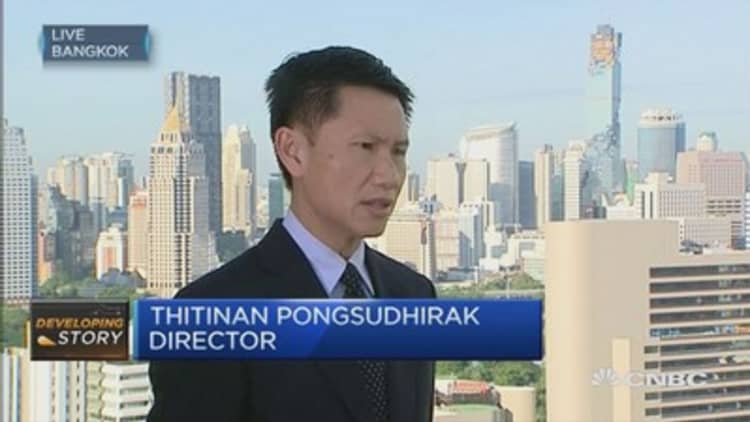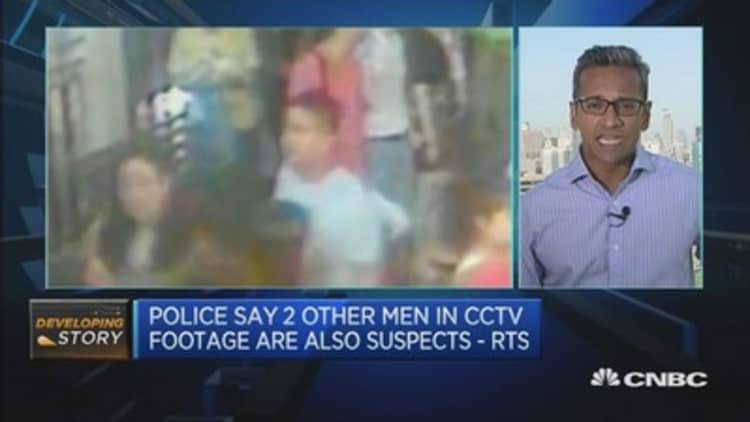Thai police have declared Bangkok's worst-ever bombing solved, even as questions grow over the investigation, the alleged culprits and their claimed motives.
In a televised address on Monday, authorities said two suspects already in custody had now confessed to carrying out the deadly August 17 blast at the Erawan shrine, in revenge for an official crackdown on human trafficking gangs.
The announcement is the latest twist in the aftermath of an attack the government has been at pains to avoid styling as international terrorism, even though many of the suspects are foreigners and more than two-thirds of the 20 dead were overseas nationals.
Adem Karadag, who is now accused of being the man in the yellow T-shirt caught by security cameras dumping his rucksack at the shrine shortly before the explosion, was detained late last month, but was initially suspected of being an accomplice rather than the bomber.
Police gave an account of a network of at least 17 people whom they said helped plot, prepare and plant the bomb at a landmark that is located in the heart of Bangkok's business district and is popular with tourists from around Asia. Thailand's ruling junta also proclaimed the investigation complete, thanking the public efforts that helped lead to the "perpetrators being brought to justice."

Officials backed further away from the idea, seen as credible by many independent analysts, that the attack was revenge for Thailand's deportation to China in July of more than 100 members of the Uighur ethnic minority. The Uighurs say they are persecuted by Beijing, which the Chinese government denies.
More than a third of those killed at the shrine were from mainland China or Hong Kong. That was a blow both to the Thai junta's efforts to forge closer links with Beijing, and to a Thai tourist industry whose growth has been driven by surging Chinese visitor numbers.
More from the Financial Times:
Thai police say near to bomb plot success
Thailand property – same, same but different
Thai protests continue despite snap poll
Somyot Pumpanmuang, Thailand's police chief, said instead that the "main motive" for the bombing was a crackdown by Thai authorities on the country's notorious human trafficking industry. He said police did not rule-out an additional link between the bombing and Thailand's long-running political crisis, which the military cited as its reason for seizing power in May last year.
Mr Somyot, who is due to retire this week, appeared before the media with several blocks of banknotes totaling about $83,000 — a reward, he said, for his investigators. He had brandished a similar bounty at a press conference shortly after Mr Karadag's arrest.

Authorities now say two bombs, including one that exploded on a Bangkok bridge the day after the shrine blast, were set off by Mr Karadag and Mieraili Yusufu, the only other suspect in custody. Mr Yusufu, who is allegedly from the Xinjiang region of China where many Uighurs live, is accused of detonating the shrine device after Mr Karadag planted it. Both men allegedly confessed after interrogation by the military junta.
Read MoreBangkok reels after deadly shrine bombing
Mr Karadag, whose nationality is still unclear, was paraded at the weekend in a televised "re-enactment" of the crime at the Erawan shrine and other central Bangkok locations. Police dressed him in a yellow T-shirt similar to the one worn by the man in the CCTV footage.
Mr Karadag, who is also known as Bilal Mohammed, was originally arrested almost two weeks after the blast, in a raid on a flat in Bangkok. Police claimed they found stacks of false passports and bomb-making equipment similar to materials used in the shrine blast.
Mr Yusufu was arrested at around the same time. Some reports said he was detained near the Cambodian frontier, while others claimed he was stopped at Phnom Penh airport.

